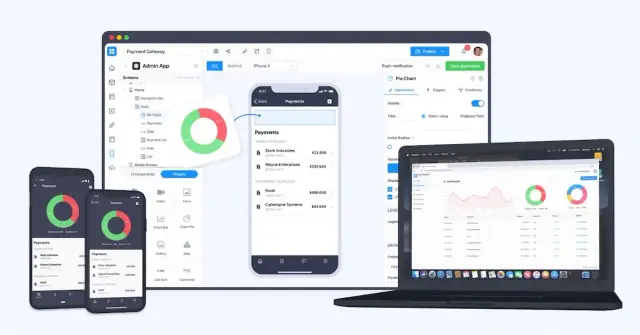The Future of Shopping: Trends in Ecommerce App Development
Explore the emerging trends in ecommerce app development and how AppMaster's no-code platform can help you create a seamless shopping experience for your customers.

Evolving Technologies in Ecommerce
Ecommerce has experienced tremendous growth over the past decade, prompting an evolution in how we shop and sell online. Businesses need to keep up with the ever-changing industry and incorporate the latest technologies to stay relevant and competitive.
As ecommerce becomes increasingly mobile-focused, developing sophisticated apps is critical for enhancing user experiences and driving sales. New technologies are shaping the future of ecommerce app development. From artificial intelligence (AI) to augmented reality (AR), these innovations offer fresh opportunities to enhance customer experiences and streamline various aspects of operating an online store.
By staying up-to-date with emerging trends, businesses can ensure their ecommerce apps meet the needs of today's digital consumers, positioning themselves as industry leaders in a constantly evolving market.
Ecommerce App Development Trends
Several exciting trends in ecommerce app development are gaining traction, with businesses striving to offer better shopping experiences and meet ever-growing customer expectations. The following are five key trends shaping the future of ecommerce app development:
Personalization
Customized shopping experiences are more important than ever, with customers demanding highly personalized content catering to their preferences and needs. Ecommerce apps utilizing AI and machine learning can analyze customer data, track users' browsing history, and offer personalized product recommendations, creating a uniquely tailored experience to keep customers engaged and encourage repeat purchases.

AI-Powered Tools
From chatbots to product recommendation engines, AI-powered tools are becoming increasingly indispensable in ecommerce app development. These tools can help improve customer support by providing instant responses to common inquiries, ensure customer satisfaction through personalized recommendations, and automate time-consuming processes, freeing up staff to focus on revenue-driving initiatives.
Augmented Reality (AR)
Augmented reality is revolutionizing the way customers shop online. By incorporating AR into their ecommerce apps, businesses can provide customers with a cutting-edge shopping experience that allows them to visualize products in their environment, get a 360-degree view of items, and even "try on" clothing or accessories. As customers gain greater confidence in their online purchases thanks to AR, businesses can expect to see reduced return rates and increased sales.
Headless Commerce
Headless commerce refers to the decoupling of the frontend presentation layer from the backend operations, enabling businesses to create custom user interfaces and integrate with various platforms more seamlessly. This approach empowers developers to create highly flexible, API-driven ecommerce apps that can adapt to the market demands and enable businesses to engage customers across multiple channels and touchpoints.
Progressive Web Apps (PWAs)
Progressive web apps combine the features of native mobile apps with the convenience of browser-based experiences, offering a more consistent user experience across devices. Developing a PWA can reduce the time and costs associated with creating separate mobile apps for various platforms while still providing a fast, responsive, and engaging experience that retains many of the benefits of native apps.
AppMaster: Empowering Ecommerce App Development
AppMaster, an industry-leading no-code platform, empowers businesses to stay at the forefront of ecommerce app development. With a powerful suite of tools and features, businesses can create sophisticated, feature-rich ecommerce applications that keep pace with evolving market trends and consumer demands.
AppMaster's no-code approach allows non-technical users to participate in the app development process, democratizing access to advanced ecommerce app creation. This ensures businesses can create, iterate, and update their apps easily and quickly, providing customers with an engaging and up-to-date app experience.
One of the key advantages of using AppMaster for ecommerce app development is its compatibility with various platforms, including web, mobile, and backend applications. This versatility enables businesses to streamline their app development processes and maintain consistency across different channels, enhancing efficiency and user experiences.

Moreover, AppMaster provides options for integrating AI-powered tools, AR features, and other emerging ecommerce app development trends, enabling businesses to stay ahead of the curve and delight customers with innovative shopping experiences.
Considering the importance of personalization in ecommerce apps, AppMaster also offers powerful tools to enable customer data analysis and personalized content delivery, ensuring each user enjoys a tailored shopping experience that encourages engagement and repeat business. By leveraging AppMaster's powerful no-code platform, businesses can create advanced ecommerce apps that meet the expectations of modern consumers and stay ahead of the competition in a rapidly evolving industry.
Choosing the Right No-Code Platform for Ecommerce
As the ecommerce industry evolves and adapts to emerging technologies and shifting consumer preferences, businesses need to be agile and responsive to deliver a superior shopping experience. Traditional software development methods may no longer suffice with long development times, high costs, and lack of flexibility. This has led to growing interest in no-code and low-code platforms as solutions to the challenges faced by ecommerce businesses. Before diving into how to choose the right no-code platform for ecommerce app development, it's pertinent to understand the benefits of these platforms and why they are becoming the go-to choice for many businesses.
Benefits of No-Code Platforms for Ecommerce App Development
- Reduced Development Time: No-code platforms enable rapid development of ecommerce applications. By automating complex processes and providing built-in components, developers can create functional applications quickly, without starting from scratch.
- Lower Costs: With no-code platforms, businesses can significantly cut development costs. These platforms eliminate the need for extensive manual coding, reducing the number of hours developers spend on a project.
- Non-Technical User Friendly: No-code solutions empower non-technical users such as marketers, salespeople, and business analysts to participate in app development. With visual editors and drag-and-drop interfaces, they can contribute to the app's design and functionality without any programming knowledge.
- Iterative Development: No-code platforms allow for quicker iterations and updates, which is crucial for ecommerce businesses as they need to respond promptly to user feedback and market changes.
Now that we know why no-code platforms are advantageous for ecommerce, let's discuss the factors to consider when choosing the right platform for your business.
Factors to Consider When Choosing a No-Code Platform for Ecommerce
- Customization: The platform should support customization to meet the unique requirements of your ecommerce business. Look for platforms that offer a range of built-in components and templates and the ability to create custom integrations and visual elements.
- Scalability: Ecommerce applications must handle fluctuations in user traffic and process large volumes of data. Choose a no-code platform that supports the development of scalable applications, which can accommodate your business's growth.
- Integration Capabilities: Your ecommerce app will likely need to integrate with various third-party services, such as payment gateways, shipping providers, or CRM systems. Select a platform that supports seamless integrations with these services to ensure a smooth user experience.
- Mobile Compatibility: Ecommerce businesses need to cater to mobile users, and a no-code platform should facilitate the creation of responsive and mobile-optimized applications. Platforms that offer progressive web app (PWA) functionality are ideal choices.
- Security: Ecommerce applications handle sensitive information like customer data and payment details. The chosen no-code platform must prioritize security and meet industry standards to protect your business and its customers.
Security and Trust in Ecommerce Applications
Today, ecommerce security is paramount. Successful ecommerce apps protect user data and business integrity by defending against breaches, frauds, and cyber threats. A secure ecommerce environment not only safeguards sensitive information but also supports regulatory compliance, such as GDPR, PCI DSS, and more. Security is the cornerstone of consumer trust; without it, users won’t feel comfortable making transactions or providing personal details, which can cripple an online business.
Features to Build Trust with Consumers
To instill confidence among users, ecommerce apps should incorporate several trust-building features. Transparent privacy policies, secure socket layer (SSL) certificates, and visible trust seals are fundamental. Two-factor authentication (2FA) and biometric logins add an additional layer of security. clear returns and shipping policies further help in establishing credibility. Effective customer service, including live chat and responsive support, also assures customers that their concerns can and will be addressed promptly.
Best Practices for Securing No-code Ecommerce Apps
No-code ecommerce app development must never compromise on security. Best practices include regular updates and patch management to protect against vulnerabilities. Using reputable no-code platforms that prioritize security and provide built-in features, such as encryption and automated backups, is crucial.
Developers should also focus on data minimization, only collecting what is necessary, and ensuring data is handled and stored securely in compliance with privacy laws. Regular security audits and penetration testing can help identify any potential weaknesses before they can be exploited. As no-code platforms evolve, staying informed and up-to-date with the latest security trends and measures will be essential for maintaining the trust and safety of ecommerce applications.
Security and trust form the bedrock upon which successful ecommerce apps stand. As such, the no-code movement must continue to emphasize strong security measures alongside the convenience and speed of app development. By doing so, no-code ecommerce apps can provide a secure platform for users to shop confidently, knowing their data and transactions are well-protected.
Future Projections: Where Ecommerce App Development is Headed
The rise of no-code platforms has the potential to dramatically reshape the ecommerce sphere. These tools democratize app development, enabling entrepreneurs with little to no technical expertise to launch and manage online stores. As no-code technology matures, we anticipate a greater shift toward personalized, adaptable, and niche ecommerce experiences. The future will likely see an increased blending of no-code with cutting-edge technologies to further streamline workflows, reduce time to market, and foster innovation in ecommerce solutions.
Predictions for Ecommerce Technology Advancements
Advancements in AI, AR/VR, IoT (Internet of Things), and blockchain are on course to integrate more deeply with ecommerce app development. AI and machine learning algorithms will refine personalization, making predictive shopping a reality. AR and VR are set to enhance the online shopping experience with virtual try-ons and immersive product visualizations.
IoT could revolutionize inventory and supply chain management, while blockchain may offer new ways to secure transactions and verify product authenticity. These technologies will provide a more engaging, efficient, and secure shopping experience, thereby driving the future of ecommerce.
Preparing for the Next Wave of Ecommerce Innovation
To stay ahead, businesses need to prepare for the rapid evolution of ecommerce app development. This includes investing in no-code education, embracing agile development methodologies, and fostering a culture of continuous improvement. Companies should also proactively explore strategic partnerships and integrate emerging technologies that complement their ecommerce offerings. As consumer expectations shift towards more interactive and seamless online experiences, staying agile and responsive to change will be key.
The future of ecommerce app development is characterized by user-centric design, seamless functionality, and cross-platform integrations powered by no-code solutions. By prioritizing ease of use, security, and adaptability, developers and businesses can leverage these trends to create shopping experiences that meet the modern consumer's demands. No-code development is set to play a crucial role in this future environment, providing the tools necessary to build the next generation of ecommerce applications.
FAQ
Trends include personalization, AI-powered tools, augmented reality, headless commerce, and progressive web apps (PWAs).
AppMaster provides a powerful no-code platform that allows users to create backend, web, and mobile applications quickly, efficiently, and cost-effectively.
No-code platforms save time, reduce development costs, allow non-technical users to participate in app development, and facilitate faster iterations and updates.
Augmented reality allows customers to visualize how products will look or fit in their environment, increasing customer engagement and confidence in their purchases.
Headless commerce decouples the frontend presentation layer from the backend services, enabling developers to create custom user interfaces and integrate with various platforms.
PWAs are web applications that function like a native mobile app but are accessed through a web browser, offering a more consistent experience across devices and reducing development costs.
Personalization helps create a tailored and engaging shopping experience, increasing customer satisfaction and encouraging repeat purchases.
AI-powered tools, such as chatbots and recommendation engines, can help improve customer support, user engagement, and drive sales by providing personalized product suggestions.





